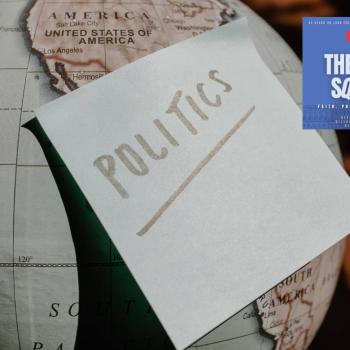
With so many horrific things going on in the world right now, it is hard not to think that everything is simply hopeless. And so, it is then hard not to look at the overall picture and feel as if there is nothing one can do. With all this violence in the world, how can I make a difference? Well, even though a part of me is pessimistic and thinks like this at times, the core of me believes in peace as a reality. And so, I am here to try to make a small difference by offering a few easy ways we can make our daily lives more peaceful. And if we all start doing these things, and then encourage others to do likewise, perhaps we can place our little mark of peace on human history. Or, perhaps we can help lead a peaceful revolution of sorts.
Perhaps . . .
- Avoid Gossip
I know this sounds basic, but it is really important, probably more so than we actually realize. This is because, when we gossip, we are creating scapegoats, needless victims if you will. Sure, in doing so, we are uniting with the ones we are gossiping with, but we are doing so by creating an enemy “other.” And this isn’t right. It isn’t just. If you are a Christian, I could say to you that it isn’t “Christlike,” as Christ didn’t create scapegoats or enemy “others.”
But it is just so tempting, isn’t it? And we do it ever-so-subtly too, even nearly non-consciously. I caught myself doing it the other day. Mimetic theory helped me recognize the subtle scapegoating I was engaging in. When I recognized it and stopped, I thought just how insidious, yet powerful, my gossiping was. I could feel the other person and myself bonding on behalf of the other. Yet, knowing what I was doing to that “other” was overwhelmingly troubling for me. “I should know better,” I thought. The only thing I could do was repent, to change my mind (metánoia). I implore all of us to do just that.
- Be a Model for your Kids
Last year, I wrote an article entitled “We do not hit!” In it, I talked about a mother who hit her child, while telling the boy “we do not hit!” What was her reason for doing this, you ask? He hit his mother in the face. I couldn’t help but cringe when I witnessed this. I remember thinking something like: “What in the [insert four letter word of choice] are you modeling to your kid!?” Perhaps that isn’t the nicest, but still . . . it’s the first thing that popped into my head.
You see, what we model for our children is of utmost importance. From the time they burst into the world, kicking and screaming (and pooping, peeing, and puking too!), they imitate mommy and daddy. That is how they learn (we have psychologists Andrew Meltzoff and Keith Moore to thank for this understanding of the human). And so, when you hit your child, it frankly doesn’t much matter if you tell him to not hit, he will copy you because he wants to be like you. Jean-Michel Oughourlian says how the power of this human truth is “dazzling in its effects.” (Oughourlian, Puppet of Desire, 2)
So please, don’t hit your kids. And please reconsider whether to spank or not, as spanking is but a euphemism for hitting. If you truly want your child not to hit, then model that for him. Model how you want him to deal with conflict, and how you think he should resolve it.
Changing gears a bit, try modeling other positive behaviors as well. Ask things like: “Can I clear your plate for you?” And then do it! Do it for others too! You know what, she just may start imitating this behavior at some point (my five year old daughter consciously just did this for the first time the other day). Trust me, this stuff works and the apple truly doesn’t fall far from the tree. Not broadly speaking, anyway.
- Be conscious of your models
A big part of how we define ourselves is in who we take on as models. Most instinctively, we look to our mother and father, perhaps a big brother or older cousin. But we also look to celebrities, politicians, professional athletes, et al. That is why the fashion industry, for instance, looks to those types of folks to endorse their products. They know we want to be “just like them.” Do you think Calvin Kleinwants my goofy ass modeling their clothes? No, they want Tom Brady. And speaking of Tom Brady, do you want to really know why people hate him? It is because we want to be like him. He is a model for many of us, but we can’t have what he has and so he becomes a rival. I mean, look, he is gorgeous, has 4 Super Bowl rings, is married to a supermodel, and deep down, you are convinced your wife wants to date him (I’m only half kidding). But seriously, who doesn’t want to have what Tom has?
What I am getting at is that we need to be conscious of who we take on as models. Mimetic theory tells us that we will non-consciously imitate them. That is why Jesus is so important. When he asks others to “follow me,” I think he was being a bit more literal than many acknowledge. He offers a way out of the rivalrous situations in which we so often find ourselves when we take on each other as models. But when we refuse to follow his positive mimesis, as it’s called, when we have models who engage in gossiping, engage in scapegoating, and have an “us vs. them”—nay, “us over them”—worldview, then we will find ourselves copying them and then getting into contentious situations, and becoming such negative models for others. In short, we will find ourselves shrouded in violence.
So be conscious of this. Well, be as conscious as you can. I know much of what makes us human is non-conscious, but we can still try to be as aware as possible of who we are taking on as models. We can ask if who we look up to is perpetually creating an enemy “other” or not. And when we are conscious of the scapegoating mechanism, we can ask how we imitate it, and change our own behavior. We can be positive models for those who, consciously or unconsciously, form identities against others.
So, I hope I offered a couple of ways that we can lead more peaceful lives. Sure, we can’t change the world in one day. We can’t disarm every nuclear bomb right now, nor stop every murder in the streets, but what we can do now is be more peaceful in our day-to-day lives. There is never “enough” peace, not until we are all living in true Peace in the kingdom of God.













